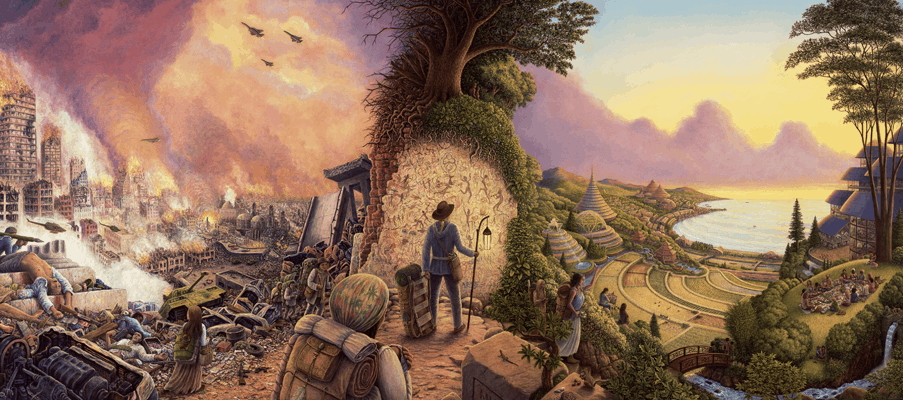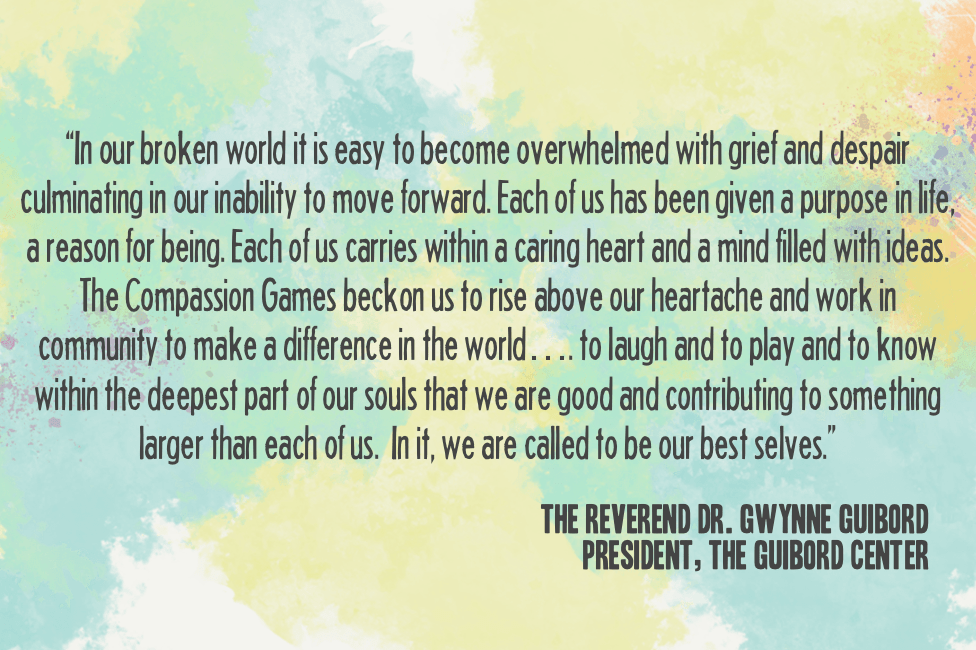(Header Image: “New Pioneers” from Mark Hensen)
At a time when religiously motivated violence seems to be more horrific and terrifying than ever, what would it take to transition our world to one of interfaith harmony and peace? It may seem pollyanna to wonder and idealistic to even ask if such a thing is possible. In a world permeated with intolerance and acts of hatred in the name of religion, how could we come to be in peace and harmony with one another? What would that take? A 21st century messiah? Divine intervention? Or a radical and creative shift of consciousness that playfully engages the full participation of the human species?
Social scientists consider this kind of problem a “wicked problem.” A wicked problem is one in which everyone agrees there is an issue, yet different stakeholders cannot agree on a definition of the problem or a course for a solution. This is because stakeholding groups in a wicked problem have radically different worldviews and thus different ways of understanding the problem and approaching a solution. World interfaith disharmony is truly such a wicked problem that can have horrific outcomes.
So how can we get to a world of interfaith harmony? Wicked problems can be “solved” by authoritative brute force, eliminating opposing perspectives and leaving power in the hands of a few. They can be “solved” through competition, leaving various parties to duke it out with a clear winner and loser. Or, they can be solved through collaboration, where all parties are brought to the table simultaneously, a common humanity is revealed, and overlaps in worldviews and values are discovered.
This is the very purpose of the Compassion Games: Survival of the Kindest. The Compassion Games awaken us to the power we each have as “players” to choose to play the “game” of life differently with each other and ourselves. As they say, “life games reflect life aims.”
We are living in a time of an emerging global world, where an essential interdependence and growing interconnectivities are 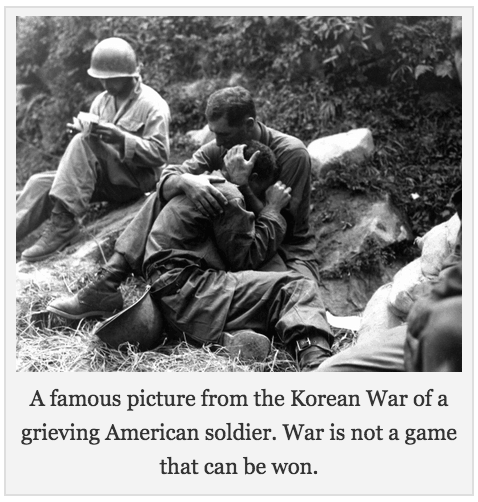 literally changing the “rules of the game” of how our world operates. The rules of the game have gone from finite, win-lose zero sum games (which, like war, are really lose-lose games) to nonzero sum games where we either all lose or we all win. Economic interdependence, terrorism, cyber-security, contagious disease control, climate change, and violence in the name of religion are just a handful of the major “nonzero” challenges that we now face, and each of them span any human-made borders that once artificially confined us as if we were fundamentally different, or separate, from our neighbors around the world.
literally changing the “rules of the game” of how our world operates. The rules of the game have gone from finite, win-lose zero sum games (which, like war, are really lose-lose games) to nonzero sum games where we either all lose or we all win. Economic interdependence, terrorism, cyber-security, contagious disease control, climate change, and violence in the name of religion are just a handful of the major “nonzero” challenges that we now face, and each of them span any human-made borders that once artificially confined us as if we were fundamentally different, or separate, from our neighbors around the world.
Can we arise to this global challenge and unprecedented moment to work together, and make collaboration and compassion the objective of the game?
Since we all have a stake in the outcome of how the game is played in our global world, each player in this new game is immeasurably valuable. A vital component and often overlooked dimension to this unfolding “global village” is the role of the individual in arising to meet the challenges of these new circumstances. It is easy for individuals to feel less significant in a coalescing sea of 7+ billion people (as if more people make each of our thoughts, concerns, and actions matter less). This feeling is amplified even more so with looming challenges that are so macro in scale and difficult to conceive. These feelings, although understandable, couldn’t be more far from the truth.
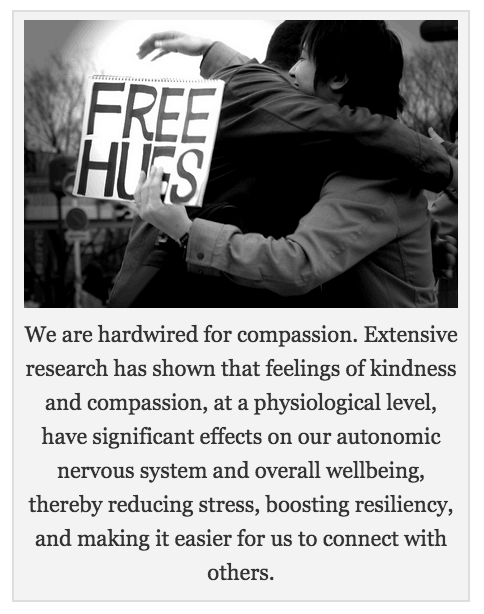 This is because in order to fundamentally solve the wicked problem of interfaith disharmony, we have to change the way we relate to each other, and this takes individual personal change and participation with others at a profound level. The collective cultural maturity required of us at this time calls for, in fact, the deepest kind of change: the change that comes from within. So in order for us to change collectively, it is each of us that needs to change personally. This is often more challenging, yet sometimes surprisingly easier and more profound than we can ever imagine. There is a power that each of us has in which we can choose to change the game we are playing, because we are playing one whether or not we are even aware of it. In this regard, we can define a game as engaging in any life activity directed toward bringing about a certain state of affairs.
This is because in order to fundamentally solve the wicked problem of interfaith disharmony, we have to change the way we relate to each other, and this takes individual personal change and participation with others at a profound level. The collective cultural maturity required of us at this time calls for, in fact, the deepest kind of change: the change that comes from within. So in order for us to change collectively, it is each of us that needs to change personally. This is often more challenging, yet sometimes surprisingly easier and more profound than we can ever imagine. There is a power that each of us has in which we can choose to change the game we are playing, because we are playing one whether or not we are even aware of it. In this regard, we can define a game as engaging in any life activity directed toward bringing about a certain state of affairs.
Compassion is an infinite game in which the purpose of the game is to continue to play. Collaboration, too, is a game that defies physical laws, where one plus one can equal ten, and the more people that play, the more can win.
We know that some people think that playing games are frivolous and not an activity worthy of something as significant and important as interfaith harmony. The idea of competing to do good – competitive altruism – seems to go against the very idea of being thoughtful and kind toward others.
Yet the original latin root for the word competition is “to strive together,” not, as it is defined today, “to strive against.” Perhaps we need to redefine what we mean by the terms “games”, “play”, “player”, and “competition”. Reframing these ideas may be a key to unlocking the creativity and inspiration that it takes to rise together and reach new heights of radical creativity, cultural maturity, and just, lasting change. The Compassion Games compel and catalyze us to strive together as “players” to change the “games” we play on planet earth to the kinds that make life better for others, ourselves, and the earth.
You may be asking: “Really? What about all the conflict and contradictions in our ways of life?”
There are tremendous differences in our nationalities, cultures, and values, of course. For there to be peace amongst us we will have to coexist in a way that deeply respects our differences and honors our unique histories, cultures, backgrounds and nationalities.
For there to be harmony we will have to learn to interact and create value together. We will find common ground in our cultural differences and we will offer support and help while learning from each other. We will have a shared sense of fulfilling some greater purpose while recognizing that we are interdependent and need each other, now more than ever.
Fortunately for all of us, the case being made that “playing compassionate games with one another from all different backgrounds can radically and creatively change the world” doesn’t have to end here in words, as a spirited and hopeful ideal. Why? Because it just happened! With World Interfaith Harmony Week having just come to a close, the results are in… and what took place is simply astounding.
Who is Leading the Way?
It is interesting to note that King Abdullah II of Jordan, who has been seen recently in the US press as a strong leader taking on ISIS (the Islamic State), was greeted with cheers on returning home early from his trip to the US to conduct swift executions of two terrorist prisoners in retaliation for ISIS killing a Jordanian pilot. The cultural call in Jordan for vengeance was great and the King was in tune with his people. While some international human rights groups may have preferred that there have not been executions, the human rights groups also recognized that the executions were within Jordanian law and important to the people. It is these cultural differences we need to better appreciate and understand. 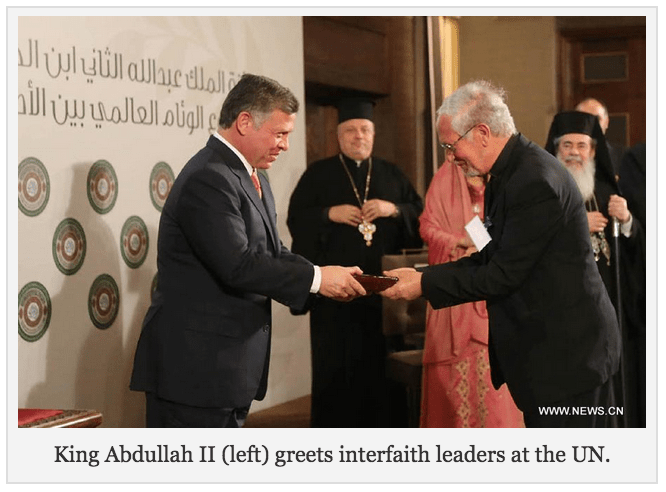
For at the same time that King Abdullah II is a “strong man” he is also dedicated to interfaith peace and harmony. Compassion
Games International (CGI) is well aware of this since in partnership with King Abdullah’s office we have just completed a seven day “coopetition” – a collaboration in which we cooperate to compete (or strive) with each other and not against each other by challenging groups from all over the world to show us their compassion in the name of interfaith peace and harmony.
From February 1st through the 7th, the Compassion Games were organized in partnership with the UN World Interfaith Harmony Week. King Abdullah II offered a $50,000 prize to be shared by groups working to create interfaith peace and harmony in the world.
This year the partners included the Dalai Lama Fellows as well as the United Religions Initiative (URI). URI hosted an online webinar for the occasion, calling out to over 670 cooperation circles that reach over one million people, inviting them to play. URI also sponsored two University of Rochester students to attend the United Nations and speak about the Compassion Games. First Nations Solar put out the Solar Challenge for faith and interfaith groups to “Sun-Up” their houses of worship and embark on solarizing campaigns to shift to clean and renewable energy as an act of “green compassion” for Mother Earth.
The players and teams that participated came from all over the world including Asia, Africa, North America, Europe, and the Middle East. In the United States, the Silicon Valley Interreligious Council challenged other interfaith councils around the world and posted the greatest number of reports in an impressive display of what is possible when we come together to play, collaborate, and challenge one another to be the very best of our human nature.
Compassion Report Map Reflections from World Interfaith Harmony Week
There were over 30 teams around the world that posted nearly 100 reports to the Compassion Report Map. You can view all the reports by visiting the map here.
Here are four stories, each strikingly different yet equally profound, that are examples of what individual players and teams did during the Interfaith Harmony Week coopetition:
Report #1: Students Meet Muslims for the First Time (View Report)
The University of Rochester Interfaith Chapel student group hosted a tour of the Interfaith Chapel during World Interfaith Harmony Week. For 14 out of 15 of the students, this was the first time they had ever visited a mosque or even spoke to a Muslim. They observed prayer, toured the center, and engaged in dialogue with the Interfaith Chapel youth group. These students had a chance to learn about Islam and to meet and interact with local Muslim youth, opening their eyes to the realities of life for Muslim citizens in this difficult time in our world’s history.
Report #2: Nourish the Soul at the Souper Bowl (View Report)
World Interfaith Harmony Week began on Sunday, February 1st, which happened to be the same day as the Super Bowl. In a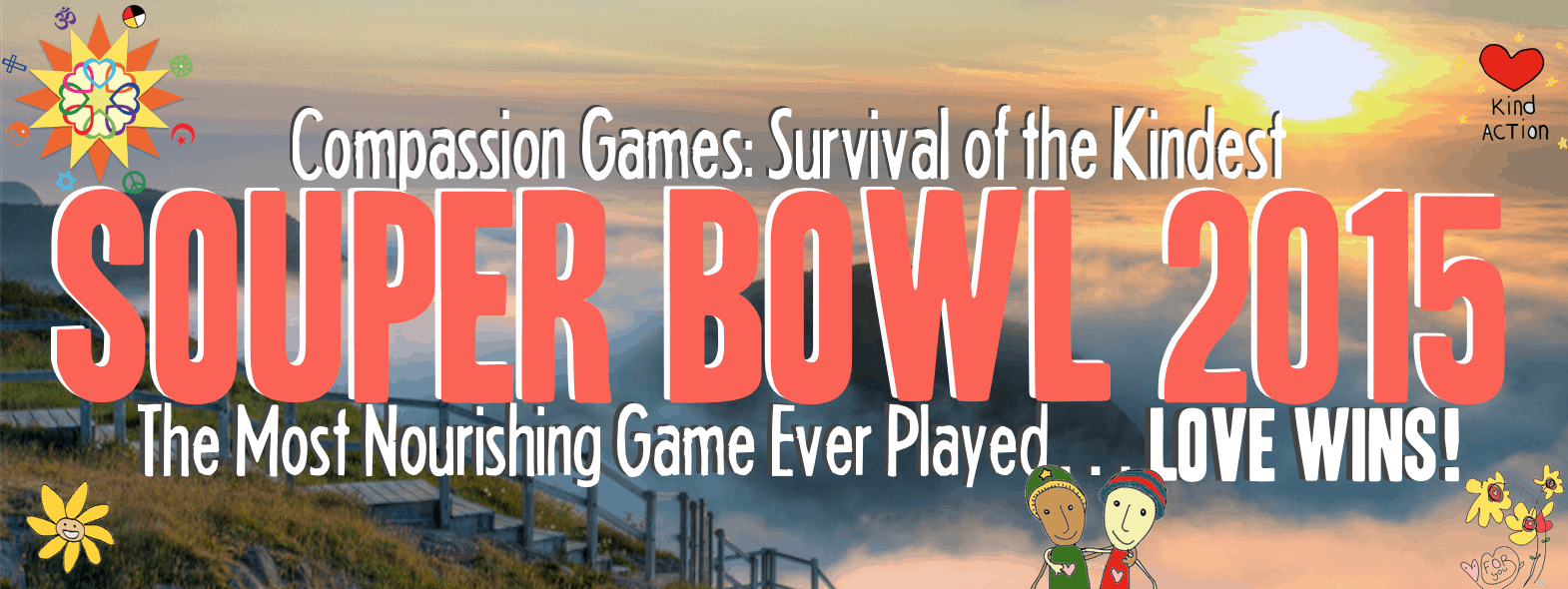 creative twist to kick-off Harmony Week and heighten our capacity for interfaith good, the Center for Spiritual Living in Seattle challenged the country in a Souper Bowl as a way to fill the food banks and take care of our neighbors in a time of need. Not surprisingly, the Center for Spiritual Living really stepped up… collecting well over 4,500 cans of soup in one week and raising $1,300 for local causes.
creative twist to kick-off Harmony Week and heighten our capacity for interfaith good, the Center for Spiritual Living in Seattle challenged the country in a Souper Bowl as a way to fill the food banks and take care of our neighbors in a time of need. Not surprisingly, the Center for Spiritual Living really stepped up… collecting well over 4,500 cans of soup in one week and raising $1,300 for local causes.
Report #3: 15,000+ People Served by Multifaith Day of Service (View Report)
The Peninsula Multifaith Day of Service dispatched more than 525 volunteers, ages 5 through 85, to a dozen sites through their region to work on 20 different projects. Pacifica Institute, who submitted this report on behalf of the Day of Service, joined the efforts with 30 volunteers of their own who also helped prepare breakfast for the 525+ volunteers. Over 15,000 people were directly affected by the actions of this awe-inspiring interfaith task force.
Report #4: Profound Reflection on Interfaith Harmony at Unity Celebration (View Report)
A report from an individual of the Interfaith Works and Women Transcending Boundaries team inspires us deeply. The report states that a “kaleidoscope” of virtually every faith joined together in unity, song, dance, and prayer, all to express their commonality within diversity. In their midst were refugees from Bosnia and Sudan who had lost everything – their homes, their families – when religious conflict tore their country apart.
From the Compassion Report Map: “When the Sudanese reminded us that churches helped them build new lives, that their history is one with the history of InterFaith Works, I thought, ‘humanity has committed some of its worst crimes in the name of religion, but religion is also capable of giving and restoring life.’ Indeed I have never experienced more compassion, acceptance, and forgiveness in one space…
“[Holding hands] as we sang… I felt myself a member of a new human community, one pregnant with possibilities, possibilities which have always been present in the highest values of our various traditions. This community, bound together not by language, not by race or creed, but by a powerful sense of hope and joy, came away from the WIHW knowing that – when it honors and accepts differences, when it forgives past injustices, but more importantly when it gathers together to celebrate all these things – religion’s long history of strife is transformed into a source of healing for the nations. Indeed, WIHW stands as an event that I dare say the critics of religion cannot pass off ‘as something that just happened’…”
Many Ways to Play and Harmonize
Between CGI and WIHW there were over 800 events and activities that took place during the seven day challenge and there were many different ways to play. These included:
- An Interfaith Edition of the Secret Agent of Compassion that sent out missions each day of the coopetition.
- As part of this years harmony week the WIHW produced the first interfaith anthem “The Gift of Love”. The lyrics are by HRH Prince Ghazi and the music and vocals by world renowned recording artist Mr. Sami Yusuf. http://youtu.be/LHFuyK65Etg
Scoreboard Results from World Interfaith Harmony Week
During the coopetition we maintain a scoreboard so we can see the progress we are collectively making. The point of the game is not to “beat others” but to challenge ourselves to do and be our very best. Over 30 teams around the world submitted nearly 100 reports showing that well over 50,000 people were served through the Compassion Games in this seven day coopetition. This is just what got reported, and most players don’t report. No one will know for sure the impact of all this interfaith kindness and caring that was unleashed, and continues to be unleashed, on our precious world.
However, the experience of coordinating the Compassion Games World Interfaith Harmony Week has reassured us that the wicked problems of our time can be solved by transforming the game of life we play and reinventing what it means to live in peace and harmony together on our beautiful planet.
The Compassion Games are a way for anyone, anywhere, at anytime to amplify existing efforts or mobilize new ones. The Compassion Games infuse the spirit of play, collaboration, and kindness to bring people together of diverse backgrounds to address some of the worlds greatest challenges and most wicked problems.
We invite you to join with us by participating in the Compassion Games. The next coopetition – “Earth Service Week” – will take place from April 18th through April 26th, the same week that U.S. Mayors are challenging each other in the Give-A-Day of service, the brainchild of Mayor Greg Fischer of Louisville. The Back-To-School Coopetition takes place in October to bring the profound benefits of compassion to students in educational settings and in their personal lives. The annual global Compassion Games take place from September 11th through the 21st, the International Day of Peace.
Will you play with us? Game on!
Solving Wicked Problems with the Compassion Games: Survival of the Kindest A Collaborative Work of the Compassion Games Team Lead Author: Jon Ramer | Founder & “First Follower” Contributing Author, Editor: Joey Crotty | Communications and Campaign Organizer Review by Sande Hart (Head Coach) and Sommer Albertson (Coordinator of the Women/Girls League)
